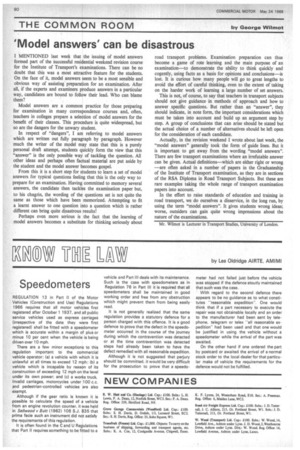'Model answers' can be disastrous
Page 92

If you've noticed an error in this article please click here to report it so we can fix it.
I MENTIONED last week that the issuing of model answers formed part of the successful residential weekend revision course for the Institute of Transport's examinations. There can be no doubt that this was a most attractive feature for the students. On the face of it, model answers seem to be a most sensible and obvious way of assisting preparation for an examination. After all, if the experts and examiners produce answers in a particular way, candidates are bound to follow their lead. Who can blame them?
Model answers are a common practice for those preparing for examination in many correspondence courses and, often, teachers in colleges prepare a selection of model answers for the benefit of their classes. This procedure is quite widespread, but so are the dangers for the unwary student.
In respect of "dangers", I am referring to model answers which are written out fully paragraph by paragraph. However much the writer of the model may state that this is a purely personal draft attempt, students quickly form the view that this "answer" is the only possible way of tackling the question. All other ideas and perhaps often factual material are put aside by the student and the model answer becomes gospel.
From this it is a short step for students to learn a set of model answers for typical questions feeling that this is the only way to prepare for an examination. Having committed to memory several answers, the candidate then tackles the examination paper but, to his chagrin, the wording of the questions set is not quite the same as those which have been memorized. Attempting to fit a learnt answer to one question into a question which is rather different can bring quite disastrous results!
Perhaps even more serious is the fact that the learning of model answers becomes a substitute for thinking seriously about road transport problems. Examination preparation can thus become a game of rote learning and the main purpose of an examination—to demonstrate the ability to think quickly and cogently, using facts as a basis for opinions and conclusions—is lost. It is curious how many people will go to great lengths to avoid the effort of careful thinking, even to the extent of taking on the harder work of learning a large number of set answers.
This is not, of course, to say that teachers in transport subjects should not give guidance in methods of approach and how to answer specific questions. But rather than an "answer", they should indicate, in note form, the important considerations which must be taken into account and build up an argument step by step. A group of conclusions that can arise should be stated but the actual choice of a number of alternatives should be left open for the consideration of each candidate.
Actually, in the revision weekend I wrote about last week, the "model answers" generally took the form of guide lines. But it is important to get away from the wording "model answers". There are few transport examinations where an irrefutable answer can be given. Actual definitions—which are either right or wrong —are often asked in a number of papers in the Graduateship of the Institute of Transport examination, as they are in sections of the RSA Diploma in Road Transport Subjects. But these are rare examples taking the whole range of transport examination papers into account.
In the effort to raise standards of education and training in road transport, we do ourselves a disservice, in the long run, by using the term "model answers". It gives students wrong ideas: worse, outsiders can gain quite wrong impressions about the nature of the examinations.








































































































































